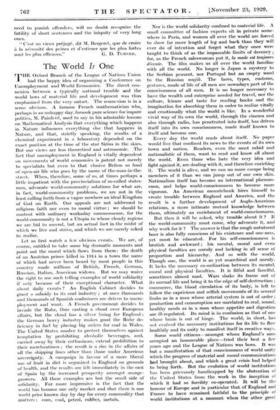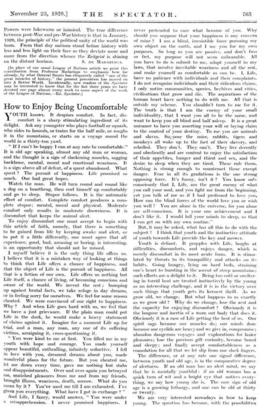The World Is One THE Oxford Branch of the League
of Nations Union had the happy idea of organizing a Conference on Unemployment and World Economics. The direct con- nexion between a typically national trouble and the world laws of material life and development was thus emphasized from the very outset. The connexion is in a sense obvious. A famous French mathematician who, perhaps in an unhappy day, forsook pure science for impure politics, M. Painleve, used to say in his admirable lessons on Mathematical Analysis that everything which happens in Nature influences everything else that happens in Nature, and that, strictly speaking, the results of a chemical experiment in a laboratory depended on the exact position at the time of the star Sirius in the skies. But our views are less theoretical and astronomic. The fact that unemployment in England is vitally dependent on movements of world economics is patent not merely to specialists but even to that elusive Briton so fond of open-air life who goes by the name of the-man-in-the- street. When, therefore, some of us, at times perhaps a little impatient with the provincialism of so-called states- men, advocate world-community solutions for what are, in fact, world-community problems, we are not in the least calling forth from a vague nowhere an ideal Kingdom of God on Earth. Our appeals are not addressed to religious faith nor even to moral virtue ; we should be content with ordinary workaday commonsense, for the world-community is not a Utopia to whose cloudy regions we are bid to ascend, but an actual fact in the midst of which we live and strive, and which we are merely asked to realize.
Let us first watch a few obvious events. We are, of course, entitled to take some big dramatic moments and point out the moral which flows from them: the death of an Austrian prince killed in 1914 in a town the name of which had never been heard by most people in this country made millions of British, French, German, Russian, Italian, American widows. But we may waive the right to use such telling examples of world solidarity if only because of their exceptional character. What about daily events ? An English Cabinet decides to grant a subsidy to its coal industry ; at once thousands and thousands of Spanish coahuiners are driven to unem- ployment and want. A French government decides to invade the Ruhr, thus casting a cloud over European affairs, but the cloud has a silver lining, for England : the German heavy industry makes good the Ruhr de- fidelity in fuel by placing big orders for coal in Wales. The United States resolve to protect themselves against temptation by prohibiting alcoholic beverages, and; carried away by their enthusiasm, extend prohibition to their merchantmen ; the result is a rise in the affairs of all the shipping lines other than those under American sovereignty. A campaign in favour of a more liberal use of fruit in diet is organized in England on grounds of health, and the results are felt immediately in the east of Spain by the increased prosperity amongst orange- growers. All these examples are but the small side of solidarity. Far more impressive is the fact that the world has become one only market and that there is one world price known day by day for every commodity that matters : corn, coal, petrol,. rubber, metals. Nor is the world solidarity confined to material life. A small conunittee of fashion experts sit in private some- where in Paris, and women all over the world are forced to show far more length of leg and back than they will ever do of intention and forget what they once were taught to think of as the impassable limits of decency ; for, as the French saleswoman put it, la mode est toujours Weenie. The film makes us all over the world familiar with all the world. No longer is Japan a mystery to the Serbian peasant, nor Portugal but an empty word to the Russian mujik. The faces, types, customs, gestures, mode of life of all men are nowadays part of the consciousness of all men. It is no longer necessary to have the wealth and enterprise needed for travel, nor the culture, leisure and taste for reading books and the imagination for absorbing them in order to realize vitally and emotionally what the world is like. In a wonderful vivid way of its own the world, through the cinema and also through radio, has penetrated into itself, has driven itself into its own consciousness, made itself known to itself and become one.
Every day the world reads about itself. No paper would live that confined its news to the events of its own town and nation. Readers, even the most rabid and nationalistic of them, want to read and know all about the world. Even those who hate the very idea and fight against it, are dealing with it, and therefore enriching it. The world is alive, and we can no more escape being members of it than we can jump out of our own skin.
Nationalism itself has become an international phenom- enon, and helps world-consciousness to become' more vigorous. An American mountebank hires himself to create trouble between England and America, and the result is a further development of Anglo-American relations, a more intimate mutual knowledge between them, ultimately an enrichment of world-consciousness.
But then it will be asked, why trouble• about it ? If the world-community must come, why advocate it, and why work for it ? The answer is that the rough untutored boor is also fully conscious of his existence and one-ness, yet must be educated. For his self-consciousness is brutish and awkward. ; his mental, moral' and even physical' faculties are unruly and lacking in all sense of proportion and hierarchy. And so with the world.
Though• one, the world is as yet anarchical and unruly.
It lacks the necessary co-ordination between its mental, moral and physical faculties. It is fitful and. fanciful, sometimes alinost mad. Wars shake its frame out of its normal life and bring it to the edge of self-destruction ; commerce, the blood circulation of its body, is left to follow the capricious and selfish movements of its several limbs as in a man whose arterial system is' out of order ; production and consumption are unrelated to real, sound, healthy needs as in a man whose appetite and digestion are ill-regulated. Its mind is in-confusion as that of one whose brain is out of hinge. The world, in short, has not evolved the necessary institutions for its life to flow healthily and its unity to manifest itself in creative ways.
Some world citizens—amongst whom. England's sons occupied. an honourable place—tried their best a few years ago and the League of Nations was born. It was but a manifestation of that consciousness of world unity which the progress of material and moral communications had brought about,, and which a great crisis. had helped to bring forth.- Ent the evolution of world institutions has been grievously handicapped by the abstention of the United States from the work in the inception of which it had so forcibly co-operated. It will be the honour of Europe and in particular that of England and France toy have remained faithful to the principle of world institutions at a moment when. the other great Powers were lukewarm or inimical.' The true difference between post-War and pre-War history is that in January, 1920, the principle of the political unity of the world was born. From that day nations stand before history with less and less light on their face as they deviate more and More from the direction whence the Zeitgeist is shining [In place of our usual League of Nations article we print this contribution from Professor Madariaga to emphasize how far already, by what General Smuts has eloquently called " one of the great miracles of history," the present generation has moved on into A Better World. - Incidentally, new readers of the Spectator may be interested to know that for the last three years we have devoted one page almost every week to some aspect of the work of the League of Nations.—En. Spectator.]































































 Previous page
Previous page